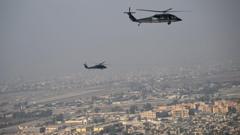As tensions escalate over Iran's stalled nuclear negotiations, non-essential personnel and their families are being removed from Iraq, signifying rising security threats in the region.
US Embassy in Iraq Undergoes Partial Evacuation Amid Rising Security Concerns

US Embassy in Iraq Undergoes Partial Evacuation Amid Rising Security Concerns
In response to increasing threats, the US has initiated a partial evacuation of its embassy staff in Baghdad.
Non-essential personnel and dependents from the US embassy in Baghdad are set to leave Iraq following recent security assessments indicating heightened risks. Although specific reasons behind the evacuation have not been disclosed, officials have pointed to a stall in negotiations concerning Iran's nuclear program—an issue that remains a focal point in US-Iran relations.
President Donald Trump conveyed his diminishing confidence regarding the prospect of a nuclear deal with Iran during a podcast, linking it to the current geopolitical climate. The US administration is pushing for Iran to cease uranium enrichment, a process capable of developing nuclear weapons, in exchange for lifting certain economic sanctions.
In a related development, Iranian Defence Minister Aziz Nasirzadeh issued a warning of potential retaliation against US military bases if diplomatic talks continue to falter, especially if military action is ordered by Trump.
Furthermore, US Defence Secretary Pete Hegseth sanctioned the voluntary exit of military families from various locations across the Middle East, signifying broader concerns about rising tensions. Hegseth noted during Congressional testimony that there are "plenty of indications" suggesting Iran's intentions may be progressing towards nuclear weapon development, despite Iran’s assertions of its nuclear program being solely for civilian energy purposes.
Compounding the situation, the UK's Maritime Trade Operations have flagged that military escalations could interfere with regional shipping, an announcement that appeared to influence a spike in oil prices—initially rising over 4% in response to the US embassy news, as concerns grew over disruptions to oil supply chains.
Currently, the US maintains a troop presence of approximately 2,500 soldiers in Iraq, focusing on counterterrorism operations and contributing to regional stability.
President Donald Trump conveyed his diminishing confidence regarding the prospect of a nuclear deal with Iran during a podcast, linking it to the current geopolitical climate. The US administration is pushing for Iran to cease uranium enrichment, a process capable of developing nuclear weapons, in exchange for lifting certain economic sanctions.
In a related development, Iranian Defence Minister Aziz Nasirzadeh issued a warning of potential retaliation against US military bases if diplomatic talks continue to falter, especially if military action is ordered by Trump.
Furthermore, US Defence Secretary Pete Hegseth sanctioned the voluntary exit of military families from various locations across the Middle East, signifying broader concerns about rising tensions. Hegseth noted during Congressional testimony that there are "plenty of indications" suggesting Iran's intentions may be progressing towards nuclear weapon development, despite Iran’s assertions of its nuclear program being solely for civilian energy purposes.
Compounding the situation, the UK's Maritime Trade Operations have flagged that military escalations could interfere with regional shipping, an announcement that appeared to influence a spike in oil prices—initially rising over 4% in response to the US embassy news, as concerns grew over disruptions to oil supply chains.
Currently, the US maintains a troop presence of approximately 2,500 soldiers in Iraq, focusing on counterterrorism operations and contributing to regional stability.






















